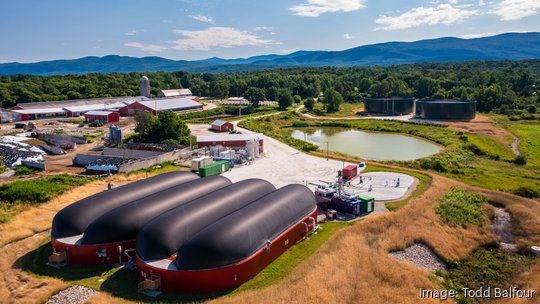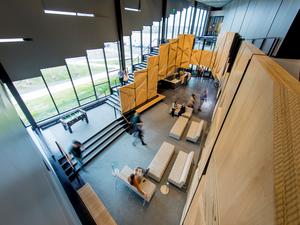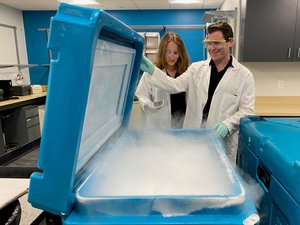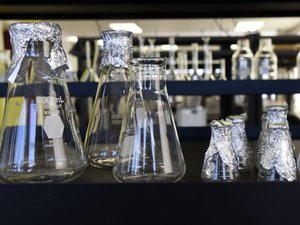
This week's life sciences industry news includes a Big Pharma company's efforts to reduce its carbon footprint, a multimillion-dollar NIH grant that researchers will use to study heart cells, an upcoming Business Journal event on gene editing, and more.
Here's the roundup:
AstraZeneca
The international Big Pharma company with major operations in Delaware entered into a partnership with Vanguard Renewables that will allow AstraZeneca (NYSE: AZN) to use renewable natural gas at all of its sites in the United States by the end of 2026.
The collaboration is part of AstraZeneca's previously announced Ambition Zero Carbon program.
Starting this month, the company will begin purchasing renewable natural gas — also known as biogas — produced by Massachusetts-based Vanguard Renewables for its Newark Campus in Delaware. The company's Newark campus packages 26 medicines for distribution across the U.S. and makes medicine formulations for global supply.
Vanguard Renewables produces biogas from cow manure and food waste.
By 2026, the collaboration will enable as much as 190,500 megawatt hours per year of renewable natural gas — equivalent to the energy required to heat more than 17,800 U.S. homes for a year — to be used across AstraZeneca’s U.S. sites.
"We recognize the interconnection between the health of people and the planet, and are committed to driving deep decarbonization across our operations and value chain," said Pam Cheng, executive vice president of global operations and IT and the chief sustainability officer at AstraZeneca.
Financial terms of the partnership were not disclosed.
Under its Ambition Zero Carbon program, AstraZeneca is on track to reduce greenhouse gas emissions from its global operations by 98% by 2026 from a 2015 baseline. The company' long-term goal is to be net zero for greenhouse gas emissions by 2045.
University of Pennsylvania
Researchers from the Perelman School of Medicine at the University of Pennsylvania received a $6 million, seven-year grant from the National Heart, Lung, and Blood Institute of the National Institutes of Health to uncover how the development and maintenance of heart cells is influenced by DNA.
The insights, Penn believes, could help drive future research on new therapies for cardiac disease.
The Penn team, led by principal investigator Dr. Rajan Jain, an assistant professor of medicine and cell and developmental biology, is interested in looking at how cardiac cells establish and maintain their identity over a lifetime. They are proposing that "nuclear architecture," which governs the availability of hundreds of genes within a cell, plays a critical role in achieving the proper identity of a cell. Specifically, Penn researchers plan to study how the packaging and organization of DNA in three dimensions — meaning understanding how DNA folds and twists in complex ways to fit into the tiny space of a cell nucleus — impacts cell development. The work is supported by their previous research, which shows that nuclear architecture governs cardiac cellular identity during both development and disease.

“This research has the potential to significantly advance our understanding of how cardiac cells arise and keep their identity for a lifetime,” Jain said. “By viewing congenital heart disease and other cardiac diseases through the lens of how DNA is organized in the cell, many therapeutic opportunities that have remained untapped may come to light.”
Gene editing event
The Philadelphia Business Journal will host an event titled "Gene Editing: Where are we, where are we going" on June 22.
The event, which begins at 8 a.m. at the City Winery in Philadelphia, will feature a one-on-one interview with Dr. Eric Kmiec, executive director and chief scientific officer of The ChristianaCare Gene Editing Institute and CEO and scientific founder of CorriXR Therapeutics. That will be followed by a panel discussion with Joseph Truitt, CEO of iEcure; Matt Handel, CEO of ExpressCells; Dr. Rebecca Ahrens-Nicklas, attending physician with the metabolic disease program and the division of human genetics at Children’s Hospital of Philadelphia; and Dr. Kiran Musunuru, scientific director of the Penn Center for Inherited Cardiovascular Disease and director of the Genetic and Epigenetic Origins of Disease Program with Penn’s Cardiovascular Institute.
Get more information and register for the event here.
Quick hits
Wayne-based Aclaris Therapeutics (NASDAQ: ACRS) completed enrollment for its Phase 2b clinical trial of oral zunsemetinib in patients with moderate to severe rheumatoid arthritis. Aclaris expects to announce study results in the fourth quarter of this year. … IPS, a Blue Bell-based provider of architecture, engineering, procurement, construction management, and validation services for the life sciences sector has appointed Jim Stephanou as its new CEO. Stephanou, who has more than 30 years of experience in manufacturing operations and engineering, spent the past eight years as vice president for global engineering solutions at Merck & Co. Inc (NYSE: MRK).







